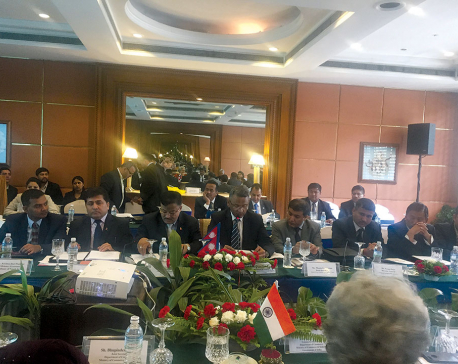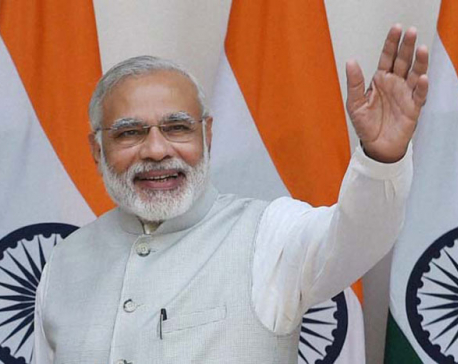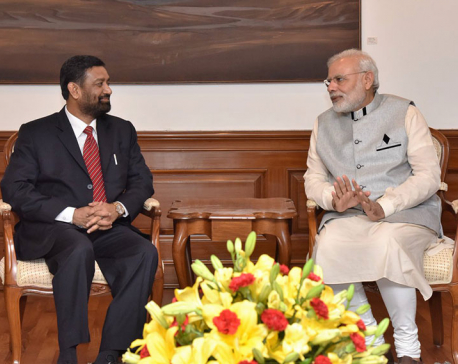
OR
No additional fee on Nepal's third-country trade from GST: India
Published On: July 20, 2017 04:30 AM NPT By: Republica | @RepublicaNepal
KATHMANDU, July 19: India has said that it would not levy Goods and Services Tax (GST) on different services at its seaports and customs points for Nepal's third-country imports and exports.
Officials of India's Ministry of Commerce and Customs, and Central Board of Excise and Customs made such commitments to Nepali officials during a meeting organized in New Delhi last week.
The meeting was organized by the Indian government as part of awareness program on GST for high-level officials of Nepal and Bhutan. A team of officials, led by deputy director general of Department of Customs (DoC), Shree Krishna Nepal, participated in the meeting.
Responding to concerns raised by Nepali officials regarding additional charges due to GST, which came into implementation from July 1, Indian authorities promised the delegation that no additional charges will be levied, Dhaniram Sharma, the spokesperson for Inland Revenue Department (IRD), who also attended the meeting, told Republica.
Charges on services like terminal handling, delays and detention, and any other detention during freight movement from the seaport to the Nepali border and Nepal border to the seaport have gone up by 3 percentage points to 18 percent after GST came into implementation.
Though India has said that it won't allow additional charges, it is not clear how the southern neighbor will exempt exports and imports of Nepal and Bhutan from the new charges.
“Indian officials have agreed on our proposal to keep charges unchanged or cap at the pre-GST level, the working modality is still undecided,” added Sharma.
With all 17 types of taxes levied by India integrated into one, Nepal's private sector is both worried and happy as the implementation of new tax regime in India has made mixed impacts in Nepal's trade relation with India, which accounts for two-thirds of the country's total trade.
Multiple rates of GST, ranging from 0 to 28 percent, on different goods will change price of imported goods in India. If imported goods are cheaper in Nepal compared to India, changes of goods flowing cross the border are high.
Nepali officials hope that the new tax regime in India will help to control informal trade between Nepal and its southern neighbor. “The new tax system encourages formal trade and addresses the problem of under-invoicing in Nepal's import from India to some extent,” added Sharma.
However, Nepal's exports to India might be affected initially as only the registered Indian traders can import from Nepal. “But these are unnecessary hypes created by some traders, as any traders having annual transaction of IRs 2 million need be registered,”
Kulraj Gyawali, the spokesperson for Department of Customs, told Republica.
Meanwhile, two separate government teams are assessing impacts of GST on Nepali economy. They are yet to come up with their reports.
You May Like This

Nepal, India agree to amend transit treaty to facilitate Nepal’s trade
KATHMANDU, April 30: Nepal and India have agreed to make amendments to the bilateral Treaty of Transit to further facilitate transit... Read More...

Nepal good friend of India: Deuba, India ready to support Nepal's development: Modi
NEW DELHI, Aug 24: Prime Minister Sher Bahadur Deuba, who is currently on a five-day state visit of India, said... Read More...

India will fully support Nepal’s new govt's priorities: Modi
KATHMANDU, Aug 20: Deputy Prime Minister and Minister for Home Affairs, Bimalendra Nidhi, who is on an India visit currently,... Read More...









Just In
- Forced Covid-19 cremations: is it too late for redemption?
- NRB to provide collateral-free loans to foreign employment seekers
- NEB to publish Grade 12 results next week
- Body handover begins; Relatives remain dissatisfied with insurance, compensation amount
- NC defers its plan to join Koshi govt
- NRB to review microfinance loan interest rate
- 134 dead in floods and landslides since onset of monsoon this year
- Mahakali Irrigation Project sees only 22 percent physical progress in 18 years









Leave A Comment